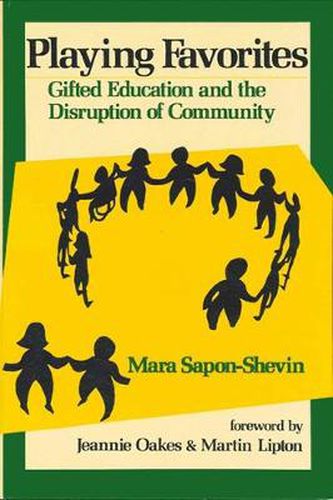Readings Newsletter
Become a Readings Member to make your shopping experience even easier.
Sign in or sign up for free!
You’re not far away from qualifying for FREE standard shipping within Australia
You’ve qualified for FREE standard shipping within Australia
The cart is loading…






This title is printed to order. This book may have been self-published. If so, we cannot guarantee the quality of the content. In the main most books will have gone through the editing process however some may not. We therefore suggest that you be aware of this before ordering this book. If in doubt check either the author or publisher’s details as we are unable to accept any returns unless they are faulty. Please contact us if you have any questions.
Playing Favorites examines the ways in which gifted education disrupts the classroom community, deskills regular classroom teachers, limits their ability and willingness to meet individual needs, and impairs the creation of a climate of inclusion and acceptance of difference. Sapon-Shevin shows here that current models of gifted education are elitist and meritocratic, treating some children, not just differently than others, but better; and that in large urban districts, gifted education programs are often racist as well. By creating and funding gifted programs, the author contends, schools engage in a form of educational triage, serving those children for whom inadequate programming and educational failure would not be acceptable while maintaining the status quo for the majority of the school population. This book provides support for teachers, parents, and administrators who have found themselves caught in the struggle of insuring an appropriate education for some children without sacrificing the good of all. Incorporating the words of teachers, parents, and students, as well as related research and theory, this book analyzes the relationship between diversity, community, and social justice. Sapon-Shevin challenges the reader to reconsider ways in which schools can meet individual educational needs while preserving communities of learners as well as the commitment to the education of all children. Finally, the book extends the challenge and assurance that we need not choose between quality education for some and mediocre education for all.
$9.00 standard shipping within Australia
FREE standard shipping within Australia for orders over $100.00
Express & International shipping calculated at checkout
This title is printed to order. This book may have been self-published. If so, we cannot guarantee the quality of the content. In the main most books will have gone through the editing process however some may not. We therefore suggest that you be aware of this before ordering this book. If in doubt check either the author or publisher’s details as we are unable to accept any returns unless they are faulty. Please contact us if you have any questions.
Playing Favorites examines the ways in which gifted education disrupts the classroom community, deskills regular classroom teachers, limits their ability and willingness to meet individual needs, and impairs the creation of a climate of inclusion and acceptance of difference. Sapon-Shevin shows here that current models of gifted education are elitist and meritocratic, treating some children, not just differently than others, but better; and that in large urban districts, gifted education programs are often racist as well. By creating and funding gifted programs, the author contends, schools engage in a form of educational triage, serving those children for whom inadequate programming and educational failure would not be acceptable while maintaining the status quo for the majority of the school population. This book provides support for teachers, parents, and administrators who have found themselves caught in the struggle of insuring an appropriate education for some children without sacrificing the good of all. Incorporating the words of teachers, parents, and students, as well as related research and theory, this book analyzes the relationship between diversity, community, and social justice. Sapon-Shevin challenges the reader to reconsider ways in which schools can meet individual educational needs while preserving communities of learners as well as the commitment to the education of all children. Finally, the book extends the challenge and assurance that we need not choose between quality education for some and mediocre education for all.